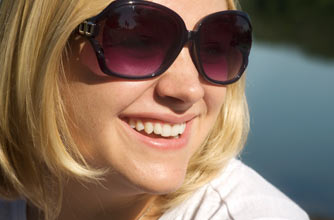The benefits of Vitamin D and sunshine
If the sun's not shining, find out the easiest ways to include Vitamin D in your diet with recipes and food ideas and what other health benefits it has

Even though it's still cold, the sunny weather and blue skies we've been experiencing make a real difference to how we feel. And it's no wonder, because sunshine doesn't just boost your mood, it provides the body with
vitamin D and, in a new breakthrough, scientists are saying that it also boosts your immune system.
It's well known that vitamin D is vital for calcium absorption and bone health and some studies have suggested it even has an anti-cancer effect, by playing a key role in activating white blood cells that protect the body from flu and cancer.
Scientists have also discovered that vitamin D plays a crucial role in supporting the immune system. This is because vitamin D triggers dormant white blood cells to find and destroy infections. At the same time, other white blood cells turn into 'helpers' that enable the immune system to build a 'memory' of the infection, so it can react more quickly if or when it happens again. This discovery is important as it could help in the development of vaccines for auto-immune diseases and cancer.
The sun provides most of the body's vitamin D because it forms under the skin in a reaction to the ultraviolet rays in sunlight. You can get the majority of the vitamin D your body needs simply from eating a healthy diet and getting a little bit of sunshine.
Why do I need vitamin D? Vitamin D keeps the levels of calcium and phosphorous in the blood normal. It also helps the body absorb calcium, which is needed to keep bones strong and healthy. And, if new research from a King's College, London, study is to be believed, it could be slowing down the ageing process. Their research found that people with higher levels of vitamin D showed fewer ageing-related changes in their DNA.
Vitamin D could also protect against heart attack and strokes, according to the Framingham Heart Study, which found that those with low levels of vitamin D in their blood were twice as likely to suffer heart failure, a heart attack or a stroke.
GoodtoKnow Newsletter
Parenting advice, hot topics, best buys and family finance tips delivered straight to your inbox.
If you're pregnant, your baby needs vitamin D to help prevent rickets and seizures and in winter, you may not be getting enough exposure to sunlight to give your body enough.
How much do I need? You don't need it every day as your body will store vitamin D for when it needs it. If you're pregnant or breastfeeding doctors advise you should take 10 micrograms (0.01mg) of vitamin D every day. Otherwise, eating a varied diet that includes fish, eggs and fortified cereals will give you all you need, so try eating at least one meal a week containing these foods.
What happens if I don't get enough vitamin D? Your bones could become brittle and thin and stop growing properly. Teeth may also grow badly and be weak. Lack of vitamin D is also thought to be responsible for the increase in colds and flu in the winter months. Serious vitamin D deficiency can lead to rickets, a disease, which causes bones to grow softened and deformed. The disease had virtually disappeared, but new cases have recently been identified in Dundee.
What happens if I get too much vitamin D? Too much vitamin D can be toxic. It can lead to hypercalcemia, which is when there's too much calcium in the blood. The result in severe cases can be kidney stones and kidney failure.
What food is it in? According to the Food Standards Agency, oily fish, such as sardines, herring, salmon and tuna, eggs, milk, margarine and liver are the main sources of vitamin D in food.
Try our quick and easy recipes rich in vitamin D Superfood salmon stir-fry Salmon fish cakes with tarragon Salmon and egg pancakes Salmon and parmesan fishcakes Salmon and dill fishcakes Island pie Mini fish pie faces Puff pastry fish pie
Find out more about how Vitamin D can help with Seasonal Affective Disorder
Will you try eating more oily fish to help stop the ageing process? Tell us what you think in Chat